Departure
MOMO KAPOR (1937-2010), WRITER, PAINTER, FRIEND
Living Is Not a Necessity, Speaking Is
He was himself and very much ours, this Momčilo. Our kind. One could live from his stories like Scheherazade. With him, one would become nostalgic, witty, joyful. No one has taught us so strongly and so easily how to love our own. Our city, our country, our virtues and shortcomings. Our women and our wines. He, a city legend, a walking chronicle of the capital, a wandering bullet of the BG spirit. We will neither say goodbye nor depart from Momčilo, the first on the list of our associates. As the poet would say, he meant so much to us that we should not express, but receive condolences. These few fragments are a greeting to Momčilo for our first next meeting
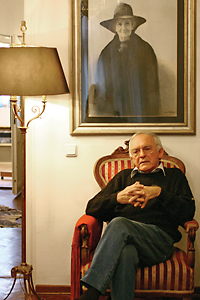 Momčilo has neither ever been in National Review nor moved away from it. We met in literary cafés and workshops, at the battlefronts in the ruins of Yugoslavia and cocktails, at the openings of exhibitions and summer seasons on the river, on saint days and parties, on sudden trips which we always welcomed with our shoes on and a little luggage packed. We spent some July nights on board of a ship meditating in the port under the Fortress, or the one which is still in Ada, or at the Tisa confluence. Once we sat on the pavement, with our backs against a warm stone wall, and spoke long about childhood and books. Often we would meet and part only a few days later. Momčilo has neither ever been in National Review nor moved away from it. We met in literary cafés and workshops, at the battlefronts in the ruins of Yugoslavia and cocktails, at the openings of exhibitions and summer seasons on the river, on saint days and parties, on sudden trips which we always welcomed with our shoes on and a little luggage packed. We spent some July nights on board of a ship meditating in the port under the Fortress, or the one which is still in Ada, or at the Tisa confluence. Once we sat on the pavement, with our backs against a warm stone wall, and spoke long about childhood and books. Often we would meet and part only a few days later.
He was himself and very much ours, this Momčilo. Our kind.
”One could live from his stories like Scheherazade. With him, one would become nostalgic, witty, joyful. No one has taught us so strongly and so easily how to love our own. Our city, our country, our virtues and shortcomings. Our women and our wines. Our ‘local mythology’. No one has initiated us better to travel and with joy, without provincialism and complaisance, discover others. He used to say about himself that he is an academic painter and naïve writer. Others say that he was a city legend, a moving chronicle of the capital, a wandering bullet of the BG spirit. Once, a long time ago, on the other side of the ocean, after being invited to criticize the regime, he said his anthological sentence which made him persona non grata of the NGO sector until his death: ‘I never speak badly about my country when I am outside of it.’”
When National Review appeared, he sent us an electronic drawer full of his masterly written texts. ”Here, boys. Use it when you want, as you want and as much as you want. You don’t owe me anything (on the contrary, you are paying off a part of my debt). I will even buy my copy at the newspaper stand; it is a gesture of support, a matter of principle. Who will buy the magazine if not those who think and feel as we do?!”
Of course, we sent him the National Review. And when our colleagues from the accounting chased him several times around the city and book fair to sign papers for paying his fee, he told them: ”What money, are you out of your mind?!”
We will neither say goodbye nor part from Momčilo. As the poet would say, he meant so much to us that we should not express but receive condolences.
However, as a greeting to Momčilo for our first next meeting, here are some fragments of his which remained in the notebooks of Miša Vujović, Maja Radonić, Radomir Mićunović, Dragana Marković and Branislav Matić, as well as in Momčilo’s drawers in all three Serbias he wrote for.
And just to have another thing clear. The famous sentence he sometimes attributed to Leonardo, sometimes to Claude Simone, sometimes to Stendhal, was actually his own: ”I believed that all my life I was learning how to live. I was actually learning how to die.”
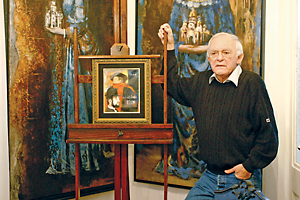 About Serbia and returning. Returning to Serbia is returning to the essence. One most often reaches it over long, interwoven and complex roads. In order to discover the essence, it is often first necessary to see the whole world and all its miracles, and after all this feel in your eyes and nostrils and in your ears, and taste in your mouth an unsatisfied hunger and thirst, feel an unspoken word on the tip of your tongue. About Serbia and returning. Returning to Serbia is returning to the essence. One most often reaches it over long, interwoven and complex roads. In order to discover the essence, it is often first necessary to see the whole world and all its miracles, and after all this feel in your eyes and nostrils and in your ears, and taste in your mouth an unsatisfied hunger and thirst, feel an unspoken word on the tip of your tongue.
And just when you feel bored and empty, you wake up in an old house in the heart of Serbia, in the middle of some town or village, go to the kitchen to your hosts, and they bring you something so rare in the world: cherry fruit preserve, a dimmed glass of cold water from the well and a small glass with homemade brandy. That is how the day begins in Serbia. And behold! Those cherries, those small golden suns served with love shining in a small glass dish immediately cancel the bitter taste of failure and futility in your mouth. Similar to the ”madeleine” dipped in tea in Proust’s In Search of Lost Time, they give back to you the long lost taste of blessed closeness and goodness.
After you have eaten the fruit preserve, you drink the glass of plum brandy from the nearby monastery. It slowly runs down your throat and gently burns your stomach with its heat. You feel the taste of tradition and time, gentleness and rage, the latent liveliness of this Serbian elixir which relaxes and excites you at the same time in an up to then unseen way. It is a mysterious mixture of the taste of plums and scent of the earth, stubbornness and recalcitrance, light melancholy, optimism and hope. As if in that taste, in that fragile glass, lays the entire Serbia, irresistible, which pervades and burns you...
While traveling through Serbia, it becomes clearer why the most powerful empires in the world fought over this small green piece of European land, and continued fighting over it to the very day.
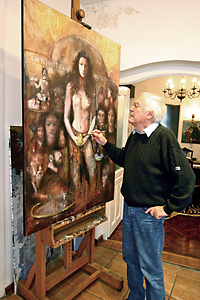 About Big Serbia. I have never supported the idea of Big Serbia. Basically, I am not interested in big states. My ideal is Malta, a country with a population as big as the municipality of Voždovac. They don’t have an army and live perfectly. Why would I be so interested in all Serbs living in one country? The Serbs will belong to one faith, one nation, but they don’t have to belong to one state. The Serbs will feel they are Serbs wherever they meet, recognize each other and when their eyes shine, which doesn’t mean they have to put fences around big meadows in order to be happy. About Big Serbia. I have never supported the idea of Big Serbia. Basically, I am not interested in big states. My ideal is Malta, a country with a population as big as the municipality of Voždovac. They don’t have an army and live perfectly. Why would I be so interested in all Serbs living in one country? The Serbs will belong to one faith, one nation, but they don’t have to belong to one state. The Serbs will feel they are Serbs wherever they meet, recognize each other and when their eyes shine, which doesn’t mean they have to put fences around big meadows in order to be happy.
About guilt. We are guilty a lot before our guilt is proven. Each visit to a foreign consulate pushes us deeper into this imaginary guilt. The strict vice consuls watch us over their eyeglasses and ask for more and more certificates, confirmations, guarantees and proof that we will not stay in Canada as woodcutters or in New Zealand to fleece sheep. Serbia has always been good at imposing the feeling of guilt to her children, even in rare times of welfare. She is truly unmatchable in this. When we are born, first our parents find us guilty for crying when we shouldn’t and not letting them sleep, our teachers find us guilty for not knowing the multiplication table, professors for not knowing when Cartagena fell or all the places we have fled to during the enemy invasions. Then our wives find us guilty for not being at home enough and our lovers for being at home too much. Our children find us guilty for not being as successful as other fathers who provide children anything they want. At a time, the communists found us guilty for not being members of the Communist Party, and then the ex-communists found us guilty for the same reason. We were guilty for having a clean conscience, while they made a turn and cultivated amnesia. The East found us guilty for leaning towards the West, and the West found us guilty for remaining in the East forever. We were guilty for all wars between the East and the West; we were guilty because we managed to survive somehow, and thus, unintentionally, became crucial witnesses reminding them of their misdeeds and betrayals. Today we own the biggest collection of guilts in the history of mankind. Even our brothers in suffering, the Jews, find us guilty because before us they had the privilege to be the guiltiest in the world.
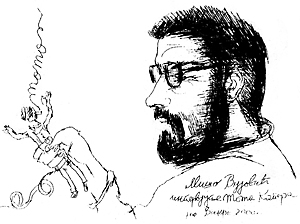 About long lost books. I have been wandering in secondhand bookstores for years and I often stumble upon books which used to mean a lot to me. I decide to buy one, but already on my way to the cash desk, who knows why, I decide not to buy it. And so holding in my hands a miraculously preserved copy with which I have spent time long ago, I think what I would start with it. I have read those pages so many times, so I don’t think I could return to them once again, however dear they had been to me. I know their contents, as well as the influence they had on my friends, peers, and me. Still, while holding an accidentally discovered book on my palms, I feel its protection which gives me security, like a valuable lucky charm. I am again in its power for a moment or two, and then follows the inevitable: why? So I put it down on a chaotic bunch of accidental books, just like sometimes I leave some especially dear face to the crowd on the boulevard after several common questions about health, growing old and the family. There is a certain futility in this gesture: even if I was very lucky in my search, I would never succeed in collecting all the books which influenced the life of the generation I belong to. About long lost books. I have been wandering in secondhand bookstores for years and I often stumble upon books which used to mean a lot to me. I decide to buy one, but already on my way to the cash desk, who knows why, I decide not to buy it. And so holding in my hands a miraculously preserved copy with which I have spent time long ago, I think what I would start with it. I have read those pages so many times, so I don’t think I could return to them once again, however dear they had been to me. I know their contents, as well as the influence they had on my friends, peers, and me. Still, while holding an accidentally discovered book on my palms, I feel its protection which gives me security, like a valuable lucky charm. I am again in its power for a moment or two, and then follows the inevitable: why? So I put it down on a chaotic bunch of accidental books, just like sometimes I leave some especially dear face to the crowd on the boulevard after several common questions about health, growing old and the family. There is a certain futility in this gesture: even if I was very lucky in my search, I would never succeed in collecting all the books which influenced the life of the generation I belong to.
About reading in the kitchen. Perhaps there is no other place where the spiritual and physical food meet so closely as on a common kitchen table covered with a cloth with red and white squares, in the moments when, carried away by reading an important book-revelation, we feel hunger and go to the stove to warm up yesterday’s beans with smoked pork ribs. We put away the book for a moment, cut the tomato and green pepper and a piece of bread, take out the salt from the cupboard and set our humble meal so that it is halfway between us and the book (which we leaned upon the loaf of bread); food for our spirit and food for our stomach. I find traces of meals I had long ago on the pages of some especially dear books. I can easily recall those blessed moments when I was eating and reading, feeling guilty because it was so late at night. I had to wake up early. I would dearly pay the wasted night and valuable sleep; however, the book took me deeper and deeper into insomnia, towards the morning which appeared in the form of pale reproach behind the dirty kitchen windows. Still, who is able to resist this intoxicating drug? Deep in the pages of some especially exciting books I find ash of cigarettes smoked long ago: food stains and the ash are more poetic to me than the dried primrose I found in 1952 in an early edition of Voltaire’s Candid in the palace of the Gradi family on the Dubrovnik piazza.
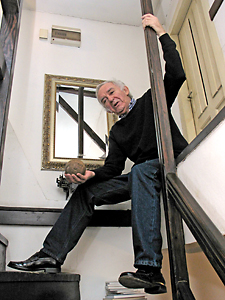 About secrets, vanity, oblivion. I don’t have any secrets. My secrets have always been pragmatic, secret loves during my marriage, secret friendships with people with whom a decent man shouldn’t be friends, but essentially I don’t have any secrets. The charnel house in Chilandar and the way the passed away monks arrive there is also one of the great lessons, just like the entire Orthodox Christianity is. Orthodox Christianity is a big, forgotten, erased lesson which the Orthodox world is only now returning to, after it had overcome its puberty, small pox and other children diseases of the civilization that caught it unprepared. The authors of icons don’t sign their names under their artworks; we don’t know who they are. All this is a story about preventing arrogance, about renouncing vanity. Same is with the skulls in the charnel house which have only their monastic names written in pencil, because it fades most slowly; their names in their secular lives remain a mystery. The fear of oblivion hits only those who are not aware of the essence of life – that we are here in this planet, that we play for a while by our or others’ rules, only to do what we are destined to, to disappear, and that no one is important. That is exactly what the Buddhist philosophers and priests have put on the pedestal of religion – human life is in perfect accordance with a tree, with the leaves that fall and turn into humus. Why would a human be different from the world around? European philosophy, derived from the antique philosophy, placed the human into the center of the world. Many have understood it literally, and behave in such a way. If there is a secret at all, it is very simple, only people keep looking for it in a complicated way. Our ancestors also knew the secret, women more than men – the secret is in humbleness, in the feeling of transience, in the feeling that one should not commit evil because it will return on him. About secrets, vanity, oblivion. I don’t have any secrets. My secrets have always been pragmatic, secret loves during my marriage, secret friendships with people with whom a decent man shouldn’t be friends, but essentially I don’t have any secrets. The charnel house in Chilandar and the way the passed away monks arrive there is also one of the great lessons, just like the entire Orthodox Christianity is. Orthodox Christianity is a big, forgotten, erased lesson which the Orthodox world is only now returning to, after it had overcome its puberty, small pox and other children diseases of the civilization that caught it unprepared. The authors of icons don’t sign their names under their artworks; we don’t know who they are. All this is a story about preventing arrogance, about renouncing vanity. Same is with the skulls in the charnel house which have only their monastic names written in pencil, because it fades most slowly; their names in their secular lives remain a mystery. The fear of oblivion hits only those who are not aware of the essence of life – that we are here in this planet, that we play for a while by our or others’ rules, only to do what we are destined to, to disappear, and that no one is important. That is exactly what the Buddhist philosophers and priests have put on the pedestal of religion – human life is in perfect accordance with a tree, with the leaves that fall and turn into humus. Why would a human be different from the world around? European philosophy, derived from the antique philosophy, placed the human into the center of the world. Many have understood it literally, and behave in such a way. If there is a secret at all, it is very simple, only people keep looking for it in a complicated way. Our ancestors also knew the secret, women more than men – the secret is in humbleness, in the feeling of transience, in the feeling that one should not commit evil because it will return on him.
While I’m saying all this, I feel a bit unpleasant because, when one speaks like this, it is assumed that he did not make any mistakes or bad deeds, so now he can preach. If anyone ever made any mistakes, it was me.
I alone am one big mistake.
About miracles. I am always hoping for a miracle to happen. Each morning I wake up with a feeling that something incredibly beautiful will happen; and usually it does. Even when it doesn’t, it is good to wait for it. I am the master of my miracle; the beautiful miracle I am speaking of depends only on me. It happens on the canvases I paint. When you are in the story, miracles are always possible. When you stand before an empty canvas, with the brush and colors beside you, you have the same chances as Titian, Monet, anyone had. It is always a square meter of white canvas and the same brush in your hand. Then I wait for a miracle to happen, for the colors to distribute themselves in a certain way that will reveal the beauty and meaning of my existence in the world, which will testify about a colored moment of my life after I am gone, from the wall of someone’s room, not necessarily a museum wall. If you create a miracle, it will always be a miracle. If you ask me if I have succeeded in this miracle, I will, of course, tell you I haven’t. But it’s nice to expect it.
***
About Writers of Belgrade Chronicles
Of all the people who have written most beautifully about Belgrade, almost none of them were born in this city. Even Dušan Radović, who used to wake us up every morning with his ‘Good Morning, Belgrade’, was born in Niš. Newcomers have grown roots in this capital of the winds and gave birth to ‘born Belgradians’. Books about Belgrade are equally important for them and those who don’t live in Belgrade any more.
***
About Laughter
Do you know how Stojan Aralica died at the age of 96? He was at the Military Medical Academy with two generals in the room. In the morning he said: ”I will now cover myself with the sheet and pretend to be dead.” He covered himself and everyone around him was laughing. The doctor came, shook Aralica, and saw that he really died. He died laughing.
***
About Possessing and Leaving
Except for what you have in your head and can do with your hands, you don’t possess anything. There is no possessing. We played for a while on earth, tried to make it a fair game, and left. We who don’t have anything die more easily and without regret. Just imagine how hard it is for Rockefeller to die and how easy it is for a vegetable seller in Čubura. That is my philosophy of life.
***
About the River and Sports
A quarter of a century ago I discovered the river Sava, Ada Ciganlija to be more exact, the magical island on the border of the city. First I was only swimming, then I started rowing shoulder to shoulder with the unbeatable Zuko Džumhur in an old Apatin river boat, and then sailing with my good friend Miša Mihailović, yachtsman, on an Olympic yacht called ”Bojana”. Now I have my own boat and I’m on the river every day. But Džumhur is gone. The world is poorer now without this wonderful artist and unique man.
If I had engaged in sports more seriously, I would certainly be a lonely long distance runner. This discipline is very similar to literature. You are alone in your track and know that you have to run for a long, long time. At the end you fall from tiredness and that’s it.
***
Drawing
Momo Kapor gave one of his longest interviews, almost 60.000 characters, which is a real small book, in the spring of 2000 to Mišo Vujović, present editor in chief of National Review for the then Glas Crnogorca. While he was giving the answers, published under the name ”Patriotism Is a Matter of Home Upbringing”, the passionate drawer held a pencil in his hand and had a piece of paper before him. When Mišo Vujović brought him the published interview, Momo Kapor replied with a drawing and surprised his collocutor who did not even know he was being drawn.
|
